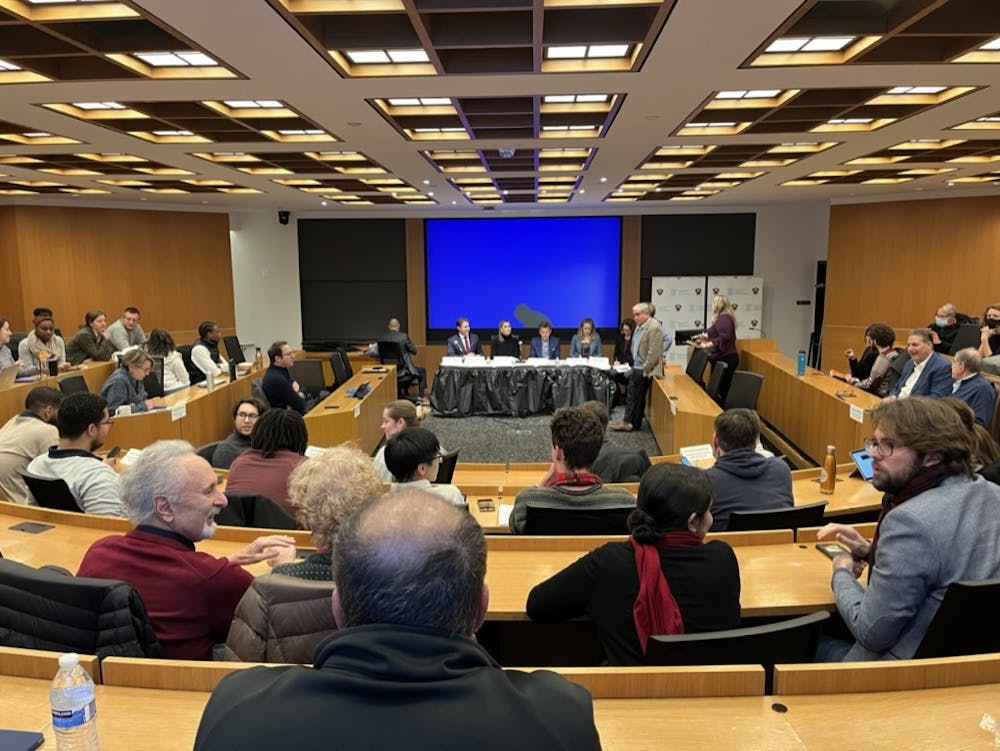A panel of journalists and political scientists convened to answer the question: “Elections 2022: What Happened? What’s Next?” The event, which was held on Wednesday, Nov. 16, was sponsored by The Center for the Study of Democratic Politics (CSDP) and the School of Public and International Affairs (SPIA).
The discussion featured journalists Lisa Lerer, a national political correspondent for The New York Times, and Steve Shepard, a senior campaigns and elections editor at POLITICO. Professor of Politics and Public Affairs Nolan McCarty, politics professor Ismail White, and politics and public affairs lecturer Lauren Wright also spoke at the event. The discussion was moderated by Tali Mendelberg, the John Work Garrett Professor of Politics.
There were some expectations that the election on Nov. 8 would result in a “red wave,” bringing Republicans to healthy majorities in both the U.S. House of Representatives and Senate. However, the Democrats flipped a Pennsylvania Senate seat, and Republicans earned a smaller-than-expected majority in the House.
“We’re all in this very complicated emotional relationship now, with polls,” Lerer pointed out, since many of the polls were actually accurate, she said.
Shepard agreed that polls were closer to reality than many viewed them.
“I think if we took the independent polls more literally, and we looked at close races across the map, maybe we would have been less surprised,” he said.
McCarty was similarly surprised about the results, and attempted to put the election into historical context.
“I think it’s no stretch to say that Democrats were in a historically awful position,” McCarty said, explaining that he went back to 1914 in his analysis. “In light of the historical context, it’s absolutely remarkable, either how we want to put it, how well the Democrats, or how poorly the Republicans did.”
McCarty noted that the Republicans winning a narrow majority in the House of Representatives isn’t necessarily a good thing for the party, as its precarious control of the chamber will likely rest on the most extreme members of the party.
“It’s a fairly Pyrrhic victory for the Republicans for reasons I think we’re seeing play out already,” McCarty said. “The first is that narrow majorities are going to heighten the factionalism embedded in that party that has been covered up by the fact that they’ve been in the minority.”
Other panelists focused on the voters and candidates themselves.
Wright analyzed the success of celebrity candidates this election cycle. Noting that while there are upsides of fielding celebrity candidates, such as automatic name recognition and press coverage, there are also many downsides to such candidates.

“Candidate quality has a lot to do with the outcome,” Wright explained. “I think there is reason to believe that celebrity candidates pose a risk to party success at the general election stage.”
“For one, we’re in a very closely divided polarized political climate where partisan control of Congress is on the ballot in every election. And Republicans are inserting novices with these crucial seats,” she added.
McCarty examined the claim that Republicans suffered losses because they fielded “weak candidates.”
“We need to think more about weak in what way. Were they just weak because they were poor campaigners — they couldn’t stay on message, they didn’t have experience?” McCarty asked. “I actually think they could see that they had the wrong policy. They had the wrong policy positions. They were too extreme.”
Looking forward, panelists agreed that future elections are uncertain, but Lerner emphasized that we need to embrace the uncertainty.
“We are still living in the extraordinary, and what I think that means for how we think about elections going forward is we need a lot more humility about perhaps what we don’t know,” Lerner said. “[We need to] accept the level of uncertainty we have and know that we’re living extraordinary times.”
Shepard also noted the stakes of the 2024 election, with a “brutal” Senate map for Democrats, but otherwise competitive presidential and congressional elections. He was careful, however, to predict results of the presidential race until the Republican party chooses their general election candidate in the primaries.
“I don’t think Donald Trump’s hold on the party has ever been more vulnerable,” he said.
The panel was hosted in Robertson Hall Bowl 016 on Wednesday, Nov. 16 from 4:30 to 6 p.m.
Charlie Roth is a Staff News Writer and Assistant Data Editor for the ‘Prince,’ focusing on local town coverage. Please send any corrections to corrections[at]dailyprincetonian.com.








